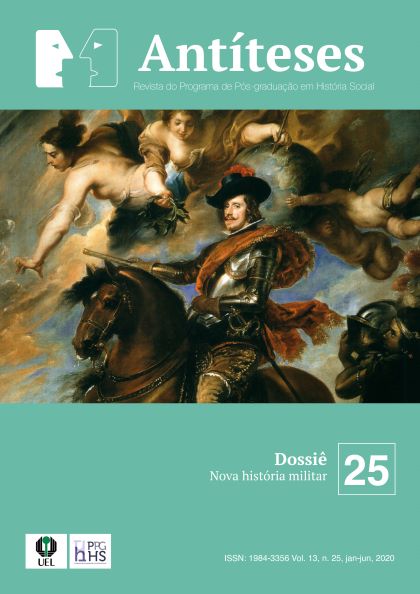Hannah Arendt and classical antiquity: reflections on the uses of the conception of liberty in Aristóteles
DOI:
https://doi.org/10.5433/1984-3356.2020v13n25p425Keywords:
Uses of the past, Hannah Arendt, AristotleAbstract
In this article, we intend to analyze Hannah Arendt 's reading filters on athenian democracy, more precisely on the conception of Aristotelian freedom in' The Constitution of Athens'. The study presented here is part of an investigation of the uses of the classical past as discursive device useful for the reflection of contemporary issues. In the present case, we are concerned with understanding in which way Aristotle's conception of freedom, appropriated by Hannah Arendt, helps the thinker to refine his reflections on the relation between politics, power and freedom, considering the political-cultural circumstances in which she is inserted. Thus, the research is justified by the need to deepen the discussion about the uses of the classical past in contemporary philosophy, since we perceive recurrent references from contemporary European philosophers, especially from French and German schools, to Greco-Roman literature. From this perspective, it is necessary, in the course of our reflections, to point out the relevance of aristotelian thought to Hannah Arendt as regards the construction of a view on the conception of freedom among the athenians, which allows us to investigate the political scene in the which she was inserted.Downloads
Download data is not yet available.
References
ARENDT, Hannah. O que é política?. 10. ed. Rio de Janeiro: Bertrand Brasil, 2012.
ARISTÓTELES. A constituição de Atenas. Tradução de Francisco Murari Pires. São Paulo: Editora Hucitec,1995. Edição bilíngue.
ARISTÓTELES. Vida e obra. Tradução de Leonel Vallandro, Gerd Bornheim. São Paulo: Nova Cultural, 1987. p. 8-30. (Os Pensadores, v.1).
ARISTÓTELES. Política. Tradução de Maria Aparecida Oliveira Silva. São Paulo: Edipro, 2019.
BAKOGIANNI, Anastasia. O que há de tão "clássico" na recepção dos clássicos?: teorias, metodologias e perspectivas futuras. Codex: revistas de estudos clássicos, Rio de Janeiro, v. 4, n. 1, p. 114-131, 2016.
FRANCISCO, Gilberto da Silva; MORALES, Fabio Morales. Desvendando o atenocentrismo. Revista de Cultura e Extensão, São Paulo, v. 14, p. 67-79, 2016. Suplemento.
GOODY, J. O roubo da história: como os europeus se apropriaram das ideias e invenções do Oriente. Trad. Luiz Sérgio Duarte da Silva. SP: Contexto, 2008.
FUNARI, Pedro Paulo Abreu. Grécia e Roma: vida pública e vida privada, cultura, pensamento e mitologia, amor e sexualidade. SP: Contexto, 2011.
SILVA, Glaydson José da. Antiguidade, arqueologia e a França de Vichi: usos do passado. Campinas: [s. n], 2005.
SILVA, Glaydson José da. O mundo antigo visto por lentes contemporâneas: as extremas direitas na França nas décadas de 1980 e 90, ou da instrumentalidade da antiguidade. Revista História, São Paulo, v. 26, n. 1, p. 98 -118, 2007.
SONTHEIMER, Kurt. Prefácio. In: ARENDT, Hannah. O que é política?. 10. ed. Rio de Janeiro: Bertrand Brasil, 2012.
ARISTÓTELES. A constituição de Atenas. Tradução de Francisco Murari Pires. São Paulo: Editora Hucitec,1995. Edição bilíngue.
ARISTÓTELES. Vida e obra. Tradução de Leonel Vallandro, Gerd Bornheim. São Paulo: Nova Cultural, 1987. p. 8-30. (Os Pensadores, v.1).
ARISTÓTELES. Política. Tradução de Maria Aparecida Oliveira Silva. São Paulo: Edipro, 2019.
BAKOGIANNI, Anastasia. O que há de tão "clássico" na recepção dos clássicos?: teorias, metodologias e perspectivas futuras. Codex: revistas de estudos clássicos, Rio de Janeiro, v. 4, n. 1, p. 114-131, 2016.
FRANCISCO, Gilberto da Silva; MORALES, Fabio Morales. Desvendando o atenocentrismo. Revista de Cultura e Extensão, São Paulo, v. 14, p. 67-79, 2016. Suplemento.
GOODY, J. O roubo da história: como os europeus se apropriaram das ideias e invenções do Oriente. Trad. Luiz Sérgio Duarte da Silva. SP: Contexto, 2008.
FUNARI, Pedro Paulo Abreu. Grécia e Roma: vida pública e vida privada, cultura, pensamento e mitologia, amor e sexualidade. SP: Contexto, 2011.
SILVA, Glaydson José da. Antiguidade, arqueologia e a França de Vichi: usos do passado. Campinas: [s. n], 2005.
SILVA, Glaydson José da. O mundo antigo visto por lentes contemporâneas: as extremas direitas na França nas décadas de 1980 e 90, ou da instrumentalidade da antiguidade. Revista História, São Paulo, v. 26, n. 1, p. 98 -118, 2007.
SONTHEIMER, Kurt. Prefácio. In: ARENDT, Hannah. O que é política?. 10. ed. Rio de Janeiro: Bertrand Brasil, 2012.
Downloads
Published
2020-08-21
How to Cite
FARIAS JÚNIOR, José Petrúcio; LIMA, Gizeli da Conceição. Hannah Arendt and classical antiquity: reflections on the uses of the conception of liberty in Aristóteles. Antíteses, [S. l.], v. 13, n. 25, p. 425–446, 2020. DOI: 10.5433/1984-3356.2020v13n25p425. Disponível em: https://ojs.uel.br/revistas/uel/index.php/antiteses/article/view/36024. Acesso em: 18 feb. 2026.
Issue
Section
Articles
License
Copyright (c) 2020 Antiteses

This work is licensed under a Creative Commons Attribution 4.0 International License.
The journal reserves the copyright on the contributions published, without material compensation for the author, and may make them available online in Open Access mode, through its own system or other databases; you can also make normative, orthographic and grammatical changes in the originals, in order to maintain the cultured standard of the language, with the final consent of the authors. The opinions expressed by the authors are their sole responsibility.










